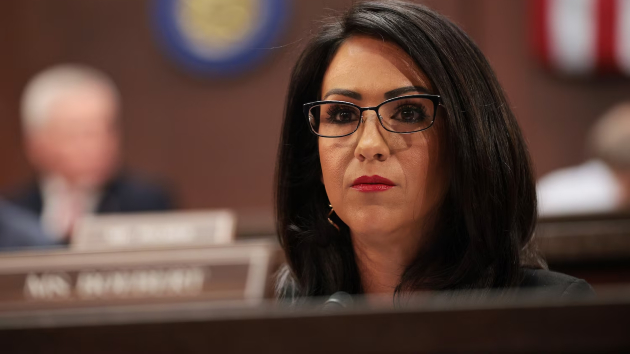FDA had ‘inadequate’ policies to heed warnings about infant formula, probe finds
Written by ABC Audio. All rights reserved. on June 13, 2024

(NEW YORK) — The Food and Drug Administration failed to heed warning signs that there were mounting concerns with one of the nation’s largest infant formula makers, as a series of babies’ severe illnesses and whistleblower complaints began to accumulate ahead of a critical shortage in 2022, the agency’s watchdog has found.
Eventually Abbott, that formula maker, would institute a massive recall and shutdown of their plant — but by that time, the FDA’s lack of communication or sufficient oversight systems had hampered their response, according to the findings of an investigation by the inspector general of the Department of Health and Human Services.
The IG’s findings, scheduled to be released Thursday, were revealed in an exclusive interview with ABC News. The audit, announced in June 2022, assessed how the agency responsible for the safety of the nation’s food and medication supply responded to complaints of infants’ illnesses after eating formula from industry titan Abbott’s plant in Michigan — and strains of the same rare but deadly bacteria had been detected inside that facility.
“If FDA had adequate policies and procedures, it could have identified underlying problems at the Abbott facility and required Abbott to correct them,” the audit concluded. While the agency “took some action” on facility inspections and follow-up, “more could have been done leading up to” Abbott’s formula recall two years ago.
Carla Lewis, the assistant inspector general who led the investigation, told ABC News that time was critical.
“What happens when you don’t immediately address risks is that you can’t mitigate and address them timely. And that’s what we were seeing,” Lewis, Assistant Inspector General for Audit Services, said. “We know that millions of babies each year may rely on infant formula as their sole source of nutrition. So being proactive and ensuring that infant formula is safe, and working with manufacturers to produce safe infant formula, is very critical in the role that FDA plays.”
The IG probe took 17 months of fieldwork and included a review of over 1,600 files consisting of approximately 10,000 pages, Lewis said. The audit team held 19 meetings with FDA officials and made over 60 requests for documentation and information.
There were “gaps and deficiencies” in the FDA’s oversight of infant formula, Lewis said.
“Improvements in [FDA’s] inspection and recall processes are needed to better ensure the safety of the infant formula supply,” the report said, finding the agency “had inadequate policies and procedures,” or had lacked them altogether, “to identify risks to infant formula and respond effectively through its complaint, inspection, and recall processes.”
In response to the findings, the FDA said it “strongly agrees that adequate policies, procedures, and authorities are needed, and delays due to poor procedures are unacceptable and must be corrected.”
“FDA takes seriously its duty to ensure the safety of the infant formula supply, with effective policies and procedures for preventing and timely responding to foodborne illnesses and food contamination events,” noting the IG’s audit “represents a snapshot in time, and the FDA continues to make progress.”
“We are committed to implementing the OIG’s recommendations for strengthening our program,” the FDA said, adding they have already “begun several steps to improve policies and procedures for complaints, recalls, and infant formula inspections.”
Abbott agreed to temporarily shutter their Sturgis, Michigan, facility in mid-February 2022, prompted by contamination concerns and the hospitalization of four infants diagnosed with a rare bacterial infection, Cronobacter sakazakii. Two of the babies ultimately died.
The FDA said it could not conclusively confirm that Abbott products caused the infants’ illnesses or deaths — something the company has also maintained. But the impact of that recall ricocheted from coast to coast, leaving a serious void in the market and forcing families to face empty shelves and scramble for alternatives. The report found that more could have been done ahead of time to potentially soften that impact.
Coming as it did amid other supply chain problems connected with the COVID-19 pandemic, the formula recall plunged many American families into crisis mode and prompted serious questions from policymakers and the public about whether a communication breakdown at the agency had abetted a sluggish response to the growing problem.
The FDA “did not have adequate policies and procedures” for crucial oversight systems, the IG’s report found — mechanisms meant to identify risks to infant formula, such as whistleblower and consumer complaints red-flagging issues.
A whistleblower complaint was sent by email to the FDA in mid-February 2021, alleging Abbott’s facility had violated laws, regulations and other guidance that FDA administered and enforced. But it took “more than 15 months” for the agency to identify that whistleblower’s warning — or forward it to an office that could investigate it, HHS-OIG’s audit found.
At that time, the IG was told by agency officials that there was no one permanently in the role responsible for “identifying and accounting for whistleblower complaints” that came in over email, the report said. Those duties were “covered” by other people who also had “other responsibilities,” and one of them “inadvertently archived the February 2021 whistleblower complaint” without forwarding it for investigation. FDA officials only identified that complaint more than a year later.
“FDA did not have adequate policies and procedures to identify and investigate the February 2021 Abbott facility whistleblower complaint,” the audit determined – even when those complaints came to the “dedicated FDA email inbox” set up to receive them.
And when it came to whistleblower complaints, IG’s report found, FDA “did not develop an organizational structure or assign responsibilities to enable the organization to operate in an efficient and effective manner.”
The FDA “implemented new whistleblower complaint procedures” a few days after the first complaint was finally forwarded in June 2022, the report said, adding, “although we did not audit the effectiveness of the complaint procedures that FDA adopted in June 2022, if effectively implemented they should assist in identifying and accounting for whistleblower complaints.”
A second whistleblower complaint came in October 2021, sent by hardcopy via courier to seven senior FDA employees and additionally emailed to multiple relevant regulatory personnel, including those at the office responsible for investigating complaints, who “acknowledged receipt of the email,” the audit said. But it took nearly four months for that complaint to get to FDA leadership, including the top brass at food policy and response, who were notified in mid-February 2022.
“Without whistleblower complaint escalation policies and procedures, FDA senior leadership was unable to make informed decisions to minimize risks related to the Abbott facility and the infant formula supply chain,” the report said.
Amid scrutiny over their process in May of that year, the FDA released a “timeline of infant formula related activities” which admitted that a second whistleblower complaint wasn’t received by FDA leadership “due to an isolated failure in FDA’s mailroom, likely due to COVID-19 staffing issues.”
“That whistleblower complaint was sent by Fed-Ex, hard copies, to multiple individuals in multiple offices, so that means it would’ve been lost at multiple offices,” FDA’s former Deputy Commissioner for Food Policy and Response Frank Yiannas said at a March 2023 congressional hearing.
“Some individuals received copies by emails and in hindsight, those should have been escalated to my office very rapidly,” said Yiannas, who just months before, had resigned from the agency.
In an interview with ABC News in April, Yiannas reflected on the lack of communication he grew frustrated with during his FDA tenure.
“I was just surprised that something like that hadn’t been elevated,” Yiannas said of the monthslong mislaid whistleblower report, noting the issues at Abbott had already been brewing for months by the time he “found out about the series of events” ensuing.
“One of the reasons I decided that it was time for me to leave the agency in the current posture that I was in, it was a very decentralized organization with a culture of very siloed mentalities,” Yiannas said. “A culture of silos is always a dangerous culture. There was this idea of accountability without responsibility. And we need some structural change.”
The IG audit stresses the need for clear communication, noting FDA’s own investigators tasked with inspecting formula facilities weren’t always armed with the most current and relevant information — such as new complaints from consumers coming in.
For example, it detailed that the FDA began an inspection at Abbott’s facility on September 20, 2021, and while that investigator had reviewed the plant’s consumer complaint history beforehand, on that very day, a new consumer complaint was entered into the system: “an infant who was diagnosed with a Cronobacter infection after consuming infant formula manufactured at the Abbott facility.”
But the FDA’s personnel “reviewing the new consumer complaint were not aware of the inspection taking place at the Abbott facility and did not communicate the complaint to the investigator” during the week of Abbott’s inspection, the report continued — so “the investigation team conducting the inspection at the Abbott facility was not informed of the new consumer complaint until after the inspection closed.”
The FDA found sanitation issues at Abbott’s Sturgis plant in September 2021, according to an inspection report previously obtained by ABC News. By January 2022, the FDA had received three of what would ultimately grow to four complaints from consumers of infants getting sick with cronobacter “potentially associated” with Abbott’s formula. By mid-February, the FDA had collected samples at the plant confirming the presence of Cronobacter in the environment, according to their timeline. Though the agency has not been able to definitively link the illnesses or deaths to the facility, Abbott agreed to voluntarily recall their products and cease production.
Lewis said they were “very concerned” when they began to realize what their probe was finding.
“Because we were seeing vulnerabilities in FDA carrying out its policies and procedures to oversee infant formula,” Lewis said, “and just overall, their engagement to ensure that risks were being mitigated and addressed.”
In the wake of the 2022 formula debacle, the FDA has overhauled their foods program, aiming to strengthen their oversight and unify the division.
Some of the actions they’ve taken include conducting their own review of their infant formula response; establishing an Office of Critical Foods, like formula; beginning steps to improve their policies for complaints, recalls and infant formula inspections; and developing policies for how and when to conduct timely mission-critical inspections — even during public health emergencies.
Outlining his agency’s overhaul in January 2023, FDA Commissioner Robert Califf told ABC News that “we really believe that with the reorganization, the system of safety and inspections will be much more preemptive.”
“We hope that with the information that we’ve shared with FDA, and the actions that they’re going to take – that the public, the American people, can build trust in terms of the infant formula that they’re buying for their babies,” Lewis said.
“There will always be risks,” Lewis added. “The key is to mitigate those risks.”
Copyright © 2024, ABC Audio. All rights reserved.





